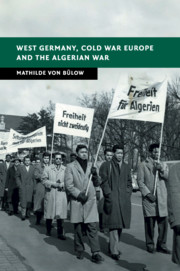Book contents
- Frontmatter
- Contents
- Acknowledgements
- List of abbreviations
- Introduction
- 1 Internationalising colonial warfare: FLN strategy and French responses
- PART I CREATING THE SANCTUARY: NOVEMBER 1954–MAY 1958
- 2 West German diplomacy and the Algerian war
- 3 The FLN's implantation in West Germany
- 4 Algeria and West German opinion
- 5 FLN contraband in West Germany
- PART II CONTESTING SANCTUARY AND SOVEREIGNTY: JUNE 1958–DECEMBER 1960
- PART III ASSERTING SOVEREIGNTY: JANUARY 1961–JULY 1962 AND BEYOND
- Conclusion
- Glossary of foreign terms
- Bibliography
- Index
3 - The FLN's implantation in West Germany
from PART I - CREATING THE SANCTUARY: NOVEMBER 1954–MAY 1958
Published online by Cambridge University Press: 05 September 2016
- Frontmatter
- Contents
- Acknowledgements
- List of abbreviations
- Introduction
- 1 Internationalising colonial warfare: FLN strategy and French responses
- PART I CREATING THE SANCTUARY: NOVEMBER 1954–MAY 1958
- 2 West German diplomacy and the Algerian war
- 3 The FLN's implantation in West Germany
- 4 Algeria and West German opinion
- 5 FLN contraband in West Germany
- PART II CONTESTING SANCTUARY AND SOVEREIGNTY: JUNE 1958–DECEMBER 1960
- PART III ASSERTING SOVEREIGNTY: JANUARY 1961–JULY 1962 AND BEYOND
- Conclusion
- Glossary of foreign terms
- Bibliography
- Index
Summary
Considering the Adenauer government's tenacious pursuit of a Franco-German entente, the Bonn Republic should have made an unlikely and unattractive refuge for the FLN. And yet the period between November 1954 and May 1958 witnessed a steady influx of Algerians into West Germany, producing something of a paradox. On the one hand, the country emerged as France's only true ally in the Algerian war, and on the other it became the chief sanctuary of the FLN's Fédération en France that would spearhead the insurgency's second armed front. What prompted this development? And more importantly, how did authorities in Paris and Bonn respond to the emergence of an Algerian sanctuary on federal territory? This chapter highlights the extent to which the exodus of Algerians from the metropole challenged French counterinsurgency efforts. Mindful of the threat this development posed to national security, French authorities sought to restrict Algerians’ movements to prevent the FLN from establishing bases and sanctuaries beyond their reach. From the perspective of the West German security services, meanwhile, the Algerians did not present an immediate threat. Their response to the FLN's presence was conditioned less by the diplomatic imperative of Franco-German reconciliation than by the domestic imperative of upholding the sovereign Rechtsstaat. As this chapter will show, these twin imperatives were far from compatible, producing some paradoxical results.
First warnings
The first indication of an Algerian presence in West Germany came in early June 1956, when former French premier Antoine Pinay approached Bonn's minister for atomic questions, Franz-Josef Strauss, with a most unusual request. Agents of the FLN, Pinay confidentially informed Adenauer's closest political ally, had been secretly meeting with Egyptian emissaries in West Germany. Such gatherings had previously occurred in Switzerland, Pinay explained, which had long been the preferred rendezvous for Arab nationalists. Recently, however, the Swiss authorities had cracked down on these meetings. French intelligence, it transpired, had even manoeuvred Swiss prosecutor-general René Dubois into authorising illicit wire taps in the Egyptian embassy in Bern, from where the FLN's external delegates supposedly coordinated much of their activity. Dubois’ clampdown, it appeared, persuaded the FLN to transfer some of its subversive activities to West Germany. To counter this dangerous development, Pinay proposed to Strauss the creation of an informal and transnational ‘Catholic front’ against the FLN.
- Type
- Chapter
- Information
- West Germany, Cold War Europe and the Algerian War , pp. 84 - 103Publisher: Cambridge University PressPrint publication year: 2016



